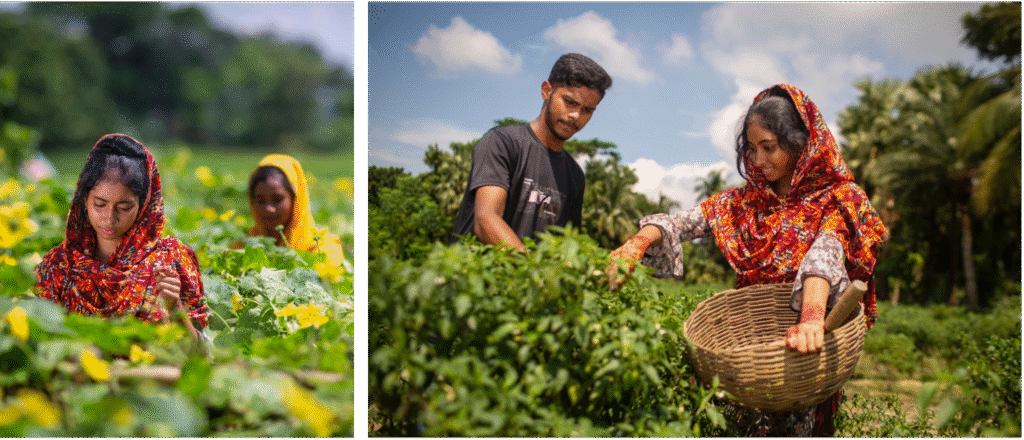
The Problem and Motivation behind:
“For six to seven months of the year, our village is flooded with stagnant water …People said it was impossible to grow vegetables here without pesticides. I wanted to prove them wrong and make my village greener.” –Ashukurta
Ashukurta (18-year-old) and her team grew up in in Satkhira, Bangladesh, where she witnessed firsthand local farmers suffering from increasing soil salinity and stagnant water caused by climate change and poor water management. Due to increasing soil salinity, cultivable land is rapidly decreasing,
It was a daily struggle for them and their families. Living in an area where six to seven months a year are spent surrounded by stagnant water, they witnessed how traditional farming methods that are heavily dependent on pesticides were failing to provide food and income
The Innovative Solution:
“In the beginning, I was told that organic farming wouldn’t work here, but I refused to believe that ….. They said, ‘We didn’t believe organic farming was possible here, but you proved us wrong.’ That makes me proud… Now, they come to us for advice on organic farming!” – Ashukurta
When Ashukurta and her team joined the Youth Innovation Lab, they chose to address the problem of unsustainable and pesticides-dependent farming methods. They wanted to explore innovative organic farming techniques in areas where traditional farming is failing. Rather than relying on large farmlands, which are often saline and waterlogged, the team focused on utilising small spaces within households. They developed a prototype for their solution that Their solution is based on:
- Cultivating creeping vegetables – Producing crops like spinach, gourds, beans, and peas, which grow vertically and don’t require much land.
- Utilising small spaces – Growing vegetables in home courtyards, rooftops, and even bamboo structures. During the rainy season, when waterlogging is severe, the project introduces floating gardens, which keep crops above the stagnant water
- Natural Fertilisers – Using organic manure from poultry and cattle instead of chemical pesticides.
- Women Engagement – Working with 20 women and households to teach organic farming methods and provide seedlings and training. “I want to show women like me that they can grow food, earn money, and make a difference—not just in Satkhira but across Bangladesh.” – Ashukurta adds.
“Before the Innovation Lab, we didn’t know how to organise our ideas. They helped us think like entrepreneurs and showed us how to make our project sustainable.” – Ashukurta
Ashukurta and her team received very positive feedback on their innovative organic farming techniques, as the trained women grew their own organic vegetables, reducing dependency on external market. They also sold the extra harvest they had, earning an extra income. Additionally, they reported a higher confidence their organic produce as being free from pesticides, contributing to healthier life.
Lessons Leaned and Addressing Challenges:
“Never listen to those who say, ‘it’s impossible.’ If you have an idea, start small, work hard, and show the world what’s possible!” – Ashukurta
The Youth Innovation Lab supportedwitha seed grant that enabled them to buy seeds and materials. They also benefited from training and mentorship support they have received in planning budgeting, and managing the project, that helped them to manage their little resources efficiently. Moreover, they faced two major challenges that contributed to their learning, as follows:
- Convincing Farmers to Change – Many villagers were doubtful about organic farming. They believed pesticides were necessary. To address that, the team demonstrated the benefits by sharing their own success stories and giving free seedlings to encourage.
- Adapting to Climate Challenges through experimenting new solutions – With flooding and unpredictable weather, finding safe places to grow crops was difficult. To address that, they experimented with vertical farming in bamboo structures and rooftops, maximising limited space.
Next Steps and Future Aspirations:
“We’re just getting started. My dream is to see our whole village—and one day the whole country—free from harmful pesticides.” – Ashukurta
Ashukurta and her team have a vision to expand organic and free from pesticides farming to more households and villages. They aim to take the following steps:
- Expanding to More Households – Training even more families to grow their own food.
- Selling to Bigger Markets – Connecting with eco-friendly businesses to sell their organic produce.
- Acquiring More Land – Ashukurta dreams of owning a large farm to increase production.